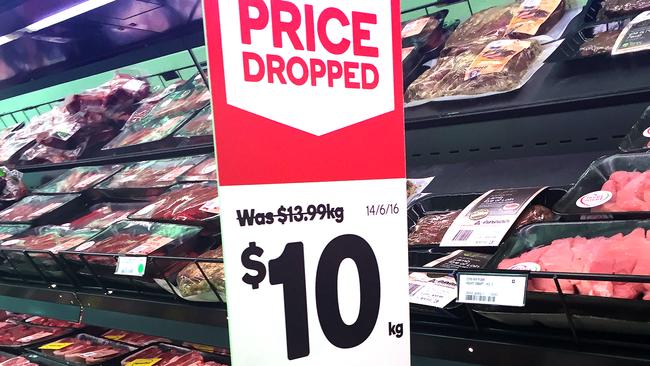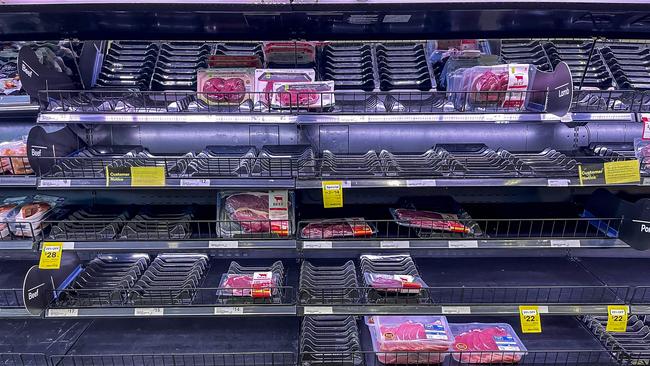Meat processors report ‘acute’ and ‘serious shortfall’ in carbon dioxide, which is critical in processing meat products
Meat processors report a ‘serious shortfall’ in carbon dioxide, which is critical in the processing and manufacturing of products.
Meat processors across the east coast of Australia are experiencing an “acute” and “serious shortfall” in carbon dioxide which is critical in the processing and manufacturing of meat products for retailers including Woolworths, Coles and Aldi.
A recent industry survey revealed most industry players could only source 50 per cent or less of their normal CO2 needs.
And while a raft of beef, pork and chicken producers were attempting to source CO2 from other non-traditional sources or looking for alternative cooling products – such as liquid nitrogen – the critical shortages of carbon dioxide was forcing them to pull back on production and remove some product lines.
The shortages across Australia are also having an impact on their business costs with higher prices for CO2 and other related supply chain woes forcing many meat producers to pass on those higher costs to the supermarkets, butchers and ultimately the consumer.
Potentially making a bad situation worse, industry insiders have warned as Australia accelerates its race to decarbonise the economy, it could have the consequence of making CO2 even more scarce.

“Last fortnight, we ran a survey to quantify supply chain disruption and shortages of CO2 in Australia. Members from across beef, smallstock and pork supply chains highlighted a serious shortfall in the eastern states, with the most common impact being the disruption to dry ice production,” Mr Hutchinson said in his letter.
Dry ice, made with CO2, is essential in the cooling of meat products as they are prepared for packaging before sent off to retailers such as supermarkets and butchers.
“AMIC will analyse the survey results and work with industry and government partners to explore solutions to what will likely be an ongoing issue to navigate,” he said.
The supermarket, food and grocery manufacturing and beverages industries are becoming increasingly alert to the threat to its own supplies from the current carbon dioxide shortage with CO2 used in hundreds of food and grocery products from baby food to packaged meat as well as medical uses in hospitals.
While meat supplies to the retailers looks to have remained adequate for now already, the supply issues for carbon dioxide have left Woolworths desperately short of its private label soda water and mineral water products with many of its stores completely sold out for weeks, leaving empty shelves where the popular beverages once stood.

AMIC general manager of industry affairs Tim Ryan told The Australian a survey of meat industry participants had shown that many were facing critical shortages of CO2.
“We did a survey of members a couple of weeks back when we were getting a lot of feedback that this was an issue and that confirmed across a range of members operating particularly across the eastern seaboard that many of them are experiencing fairly acute shortages of CO2,” Mr Ryan said.
“Most respondents to the survey indicated they could only procure 50 per cent or less of their normal business needs, which is having a range of impacts across different businesses in a few areas. But the most notable was the impact on dry ice production and that’s used in a range of applications but particularly the cooldown of product.”
Mr Ryan said some meat processors had reduced their throughput because of the lack of CO2 supply, especially chilled meat products and producing more frozen meat products, while the cost burdens will be likely passed on to retailers and ultimately consumers.
“Some have reduced other product lines, and some have had to cough up and find what CO2 they can and then have to pass those costs down the supply chain all the way to the consumer.
“So overall, some adaptation, some reduction in certain products and also having to pass on those costs.”
Mr Ryan said the shift to decarbonising the economy could make matters worse.
“Other countries have experienced similar problems, and it does appear to be a structural problem fuelled by high energy prices and certain CO2 producing industries reducing or closing.
“But also as we decarbonise the economy we will generally be producing less CO2 as well, so this isn‘t going to go away.”
It is believed the poultry industry uses more CO2 in its production and packaging process than red meat and is more exposed to carbon dioxide shortages.
A spokesman for Inghams told The Australian over the weekend the current CO2 shortage on Australia’s east coast has had minimal impact on the company’s primary processing operations but was having a “modest impact” on the production of some value enhanced products.
“Inghams is taking positive steps to minimise the effects of this issue on its operations, with the conversion of its processing facilities to liquid nitrogen either underway or already completed.”






To join the conversation, please log in. Don't have an account? Register
Join the conversation, you are commenting as Logout